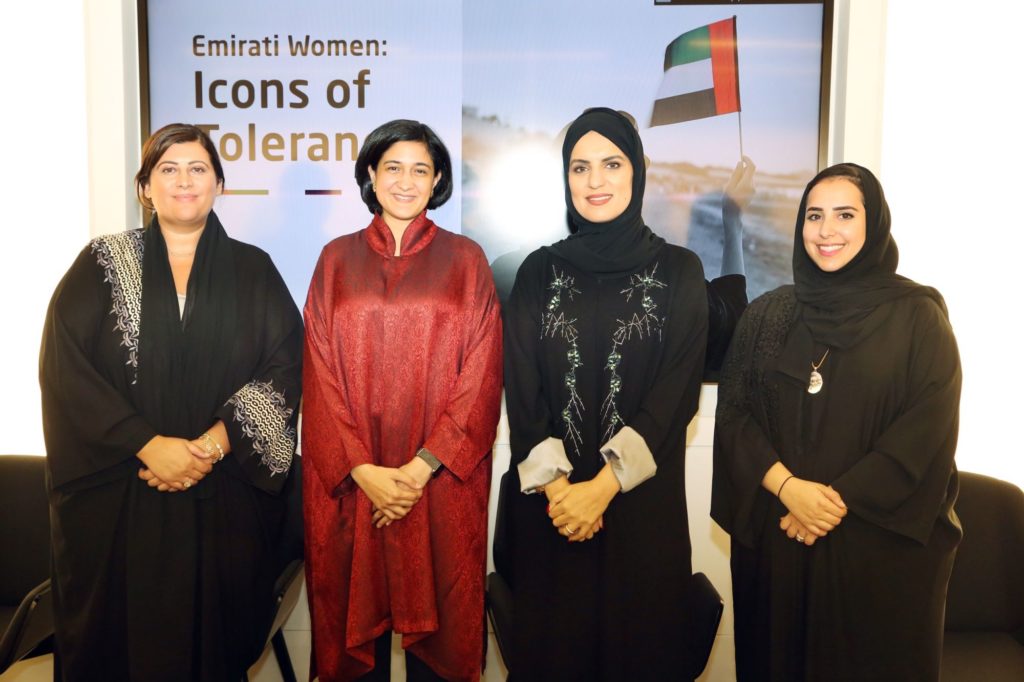Emirates celebrates Women’s Day
The UAE Gender Balance Council was established in 2015 as a federal agency dedicated to scaling up the UAE’s efforts to achieve gender balance across all sectors nationwide, as well as in decision-making positions.
Photo: Young Arab leaders

Each year, the United Arab Emirates celebrates the Emirati Women’s Day on August 28. Launched by Sheikha Fatma Bint Mubarak, Chairwoman of the General Women’s Union, Supreme Chairwoman of the Family Development Foundation, and President of the personSupreme Council for Motherhood and Childhood in 2015 to celebrate women hood and acknowledge the role played by women and their contribution to society and nation building in the United Arab Emirates, it has now become a national celebration.
Women have come a long way in the country, with participation in every field. As an article in Arabian Business underscores “from Olympian medalists to ministers making vital decisions and even aspiring scientists and astronauts planning to make a trip into space, women have always been in the forefront of the UAE’s culture and society,” going on to quote the late President and Founder of the UAE, H.H. Sheikh Zayed bin Sultan Al Nahyan who said “The woman is half of the society, any country which pursues development should not leave her in poverty or illiteracy. I am on the woman’s side; I always say this in order to uphold her right to work, and participate in the building process of her country.”
Women in the UAE have set themselves as partners with distinction in the diplomatic field, contributing to the development of an expansive network of international relations and enhancing regional and international partnerships, according to Emirates News Agency WAM. It points out that currently Emirati women serve in the diplomatic and consular corps at the UAE Ministry of Foreign Affairs and International Cooperation, among them 275 are diplomats, accounting for 42 percent of women serving in UAE missions abroad.
The UAE Ministry of Foreign Affairs and International Cooperation appointed eight Emirati women as ambassadors and diplomats to represent the country in international forums, including Hessa Abdullah Al Otaiba as UAE Ambassador to the Netherlands, Hanan Khalfan Alili as UAE Ambassador to Latvia, Fatima Khamis Al Mazrouei as UAE Ambassador to Denmark, Hafsa Abdullah Al Olama as UAE Ambassador to Brazil, Noura Mohamed Abdel Hamid Jumaa as UAE Ambassador to Finland, Dr. Nawal Khalifa Al Hosani as UAE’s Permanent Delegate to the International Renewable Energy Agency, IRENA, and Permanent Representative of the UAE to the United Nations in New York Lana Zaki Anwar Nusseibeh, in addition to UAE Consul General in Hong Kong-China Nabila Abdulaziz Al Shamsi.
According to WAM the UAE Constitution guarantees equal rights for both men and women. Under the Constitution, women enjoy the same legal status, claim to titles, access to education, the right to practice professions, and the right to inherit property as men. Women are also guaranteed the same access to employment, health and family welfare facilities. As a leader of equality in economics, government, education and health, the UAE has been named one of the region’s pioneers.
In December 2014, the UAE Cabinet adopted a decision imposing the appointment of women on the boards of directors of all institutions and government agencies, setting the proportion of female representation at 15 percent in government institutions. Women make up 27 percent of the UAE Cabinet formed in 2016 which includes nine female ministers, one of whom is the youngest minister appointed to Cabinet. Furthermore, eight women sit on the Federal National Council for the current legislature, representing 20 percent of its 40 members.
President Sheikh Khalifa bin Zayed Al Nahyan has recently called for Emirati women to occupy 50 percent of the seats in the country`s Federal National Council following this year’s elections. This decision reinforces the country`s plans towards the full empowerment of Emirati women across vital sectors. It also aims to further empower Emirati women and bolster their contributions to development, an accomplishment achieved in record time compared to other countries in the world.
The UAE Gender Balance Council was established in 2015 as a federal agency dedicated to scaling up the UAE’s efforts to achieve gender balance across all sectors nationwide, as well as in decision-making positions.
In 2018, the UAE Cabinet has approved t
Lllissuance of the Law on Equal Wages and Salaries for Men and Women to ensure that women have equal opportunities as partners in the UAE’s development. The Cabinet’s approval of the Law on Equal Wages and Salaries comes in line with the government’s objective to ensure the protection of women’s rights and support their role in the national development process. The Law is also part of the Strategy for the Empowerment of Emirati Women launched by H.H. Sheikha Fatima bint Mubarak, Chairwoman of the General Women’s Union, President of the Supreme Council for Motherhood and Childhood, and Supreme Chairwoman of the Family Development Foundation.
All these initiatives have reaped rich dividend and the UAE today ranks second in the Middle East for ‘wage equality for similar work’ according the Global Gender Gap Report 2017. In fact, women hold two-thirds of public sector jobs in the UAE, with 30 percent in leadership roles and 15 percent in technical and academic roles. Women also are actively involved in the judiciary sector with several women judges and prosecutors, as well as a significant female presence in the police and the military.
While the literacy rate of both women and men in the UAE is close to 95 percent, today, more women than men complete secondary education and enroll in university and post-graduate institutions. Emirati women make up 70 percent of all university graduates in the UAE, reported WAM.